Burkina Faso cracks down on BBC and VOA
Burkina Faso’s military regime has stopped BBC and VOA (Voice of America) radio networks from broadcasting within the country after their coverage of a HRW (Human Rights Watch) report about army massacring at least 223 civilians, in two villages on February 25.
The report published on HRW’s X (formerly Twitter) handle on April 25 said the Burkinabe army massacred civilians in the villages of Nondin and Soro, situated in Thiou district, North Yatenga province, accusing them of collaborating with Islamist terrorist organisations.
My Daily Brief now in 6 different versions:
📰 English: https://t.co/IGijD7ebL6
📰 Français: https://t.co/nWp767abEd
📰 Deutsch: https://t.co/BFl2h0Sj5Q
📰 Español: https://t.co/mmUpmz9EqU
🔊 Audio: https://t.co/ZkoNX1GWNH
📺 Video: pic.twitter.com/IBz2fesS0l
— Andrew Stroehlein (@astroehlein) April 26, 2024
The report also stated that the massacre was the worst army abuse in Burkina Faso since 2015. Of the 223 killed villagers, 56 were children. HRW also published several eye witness accounts from the survivors of the massacre, including video evidence supporting their claims.
Burkina Faso’s Superior Council for Communication (known by its French acronym CSC) announced on Thursday that the programmes of BBC and VOA international radio networks broadcasting from the capitol city of Ouagadougou for the next two weeks.
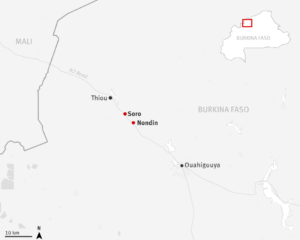
CSC also claimed HRW’s report made false accusations against the army is likely to create public unrest, while mentioning the lack of tangible proof and bias in the HRW report, covered by BBC and VOA. It also said that the nations’ internet service providers were ordered to suspend access to HRW, VOA and BBC websites and other digital media platforms.
The Communication spokesperson for Burkina Faso, Tonssira Myrian Corine Sanou had previously warned digital news platforms from covering the story citing “false allegation”.
HRW report highlights Burkinabe Army’s atrocities
It was reported that Islamist armed groups had carried out coordinated attacks on vital military as well as civilian installations in the country on the nights of 24 and 25th February. In retaliation the Burkinabe army perpetrated mass killings of villagers in two villages, believing that they had supported the Islamist groups attack on Burkinabe military and militia camp outside the provincial capital of Yatenga province, Ouahigouya.
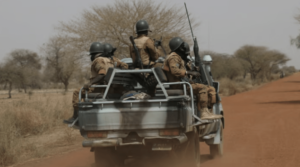
The survivors of the harrowing incident stated that around 9 a.m., in the morning a military convoy of over 100 Burkinabe soldiers arrived in the village of Nondin on trucks, armoured cars and motorbikes. Then the soldiers went door-to-door, ordering people out of their houses to show id cards. Upon rounding up the entire village in one spot, they opened fire on the villagers, killing those who tried to escape or hide as well.
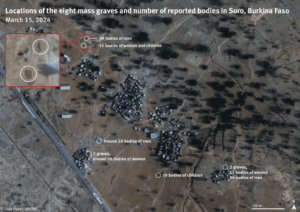
30 minutes later a similar incident was perpetrated in the village of Soro, 5 km away from Nondin. HRW received several eye witness accounts from the surviving villagers of Nondin and Soro that reflected the rapid and systematic approach of the Burkinabe army in committing the said atrocities. HRW also shared satellite images marking three mass graves in Nondin and eight more in Soro.
A 61-year-old man from Nondin who was injured and lost 11 family members, including his wife, son, brothers and nephews said, “They made us sit down … and then they opened fire on us. They shot “Pa! Pa! Pa!” They shot us like that, killing all the members of my family. I was injured in the armpit because I raised my hands to ask for “mercy.” One bullet passed through the armpit, and another bullet pierced my right thigh.”
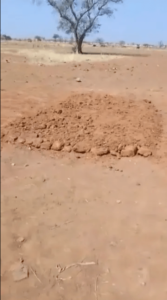
Another 25-year-old man from Soro who lost 16 family members, including his wife, mother and father said, “They [soldiers] were agitated and talked through walkie-talkie in Moré language, with a distinctive accent from Ouahigouya. As soon as we got by the main road, they sprayed us with gunfire. They shot at everyone. People started falling over each other.… I was injured in my left shoulder. The bullet passed through my armpit and broke my arm.… I think the soldiers wanted to ensure there were no survivors because before leaving they shot several rounds at people who were already on the ground.”
Burkina Faso’s suppression of Press
During a press release on 25 February, Burkinabè Défense Minister Mahamoudou Sana denounced the Islamist attacks on the nights of 24 and 25 but did not mention the mass killings of villagers in Nondin and Soro.
The current military regime of Burkina Faso is led by Captain Ibrahim Traore who seized power through a military coup in Sept. 2022, eight months after another military coup that had overthrown the democratic government of President Roch Marc Kabore.
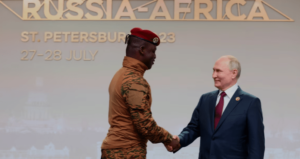
Burkina Faso’s government had previously suspended French TV outlets LCI, France24 as well as radio broadcasting agency Radio France Internationale.
Since the beginning of the Islamist insurgency in Burkina Faso, there have been many reports of such atrocities being routinely committed by the army with estimates suggesting over 8,000 people died in 2023 and over 430 in January 2024 alone. Currently Burkina Faso has turned to Russia for security equipment exports since ousting France in 2021.
The current suspension of BBC and VOA points at the similar trend of cover up by the current military regime of Burkina Faso as has been witnessed in the past.











